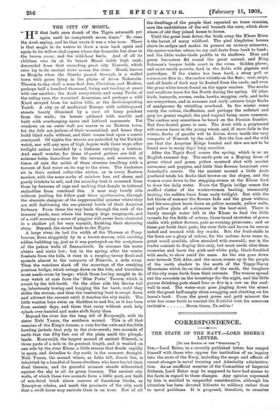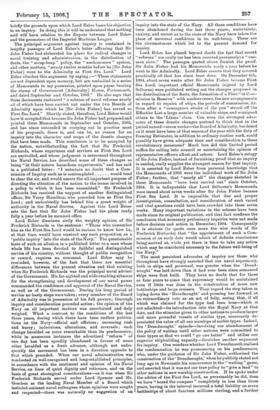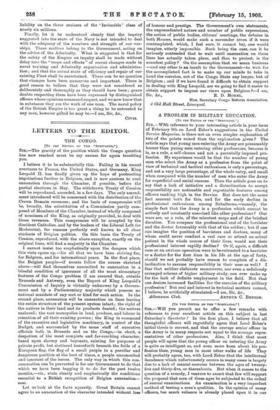CORRESPONDENCE.
THE STATE OF THE NAVY.—LORD ESHER'S LETTER.
LTO ma EinTos OF THE " SPROTATOV:]
Sin,—Lord Esher, in a recently published letter, has ranged himself with those who oppose the institution of an inquiry - into the state of the Navy, including the scope and effects of recent changes in naval training and Admiralty administra- tion. As an unofficial member of the Committee of Imperial Defence, Lord Esher may be supposed to have had access to the facts in regard to these changes. Any opinion expressed by him is entitled to respectful consideration, although his attention has been devoted hitherto to military rather than to naval problems. It is proposed, therefore, to examine
briefly the grounds upon which Lord Esher bases his objection to an inquiry. In doing this it will be understood that nothing said will have relation to the dispute between Lord Esher and the promoters of the Imperial Maritime League.
The principal argument against inquiry is contained in lengthy passages of Lord Esher's letter affirming that Sir John Fisher had elaborated his plans for radical changes in naval training and administration, in the distribution of fleets, the " scrap-heap " policy, the " nucleus-crew " system, and other matters, "nearly twelve months before he [Sir John Fisher] went to the Admiralty as First Sea Lord." Lord Esher clinches this argument by saying :—" These statements are not dependent upon memory, but are embodied in a series of Memoranda in my possession, printed upon paper bearing the stamp of Government [Admiralty] House, Portsmouth, and dated September and October, 1903." He also says that these documents embraced "a scheme of naval reforms nearly all of which have been carried out under the two Boards of Admiralty upon which he [Sir John Fisher] has served as First Sea Lord." Shortly stated, therefore, Lord Esher would have it accepted that because Sir John Fisher had prepared and printed these Memoranda in September and October, 1903, and has since succeeded in carrying out in practice most of his proposals, there is, and can be, no reason for an inquiry into the character and scope of the drastic changes that have been made. This conclusion is to be accepted by the nation, notwithstanding the fact that Sir Frederick Richards, whose experience and services as First Sea Lord are unrivalled, and whose judgment is reverenced throughout the Naval Service, has described some of these changes as being "in their nature hazardous experiments," and has said in a published letter : "I entertain no doubt that a Com- mission of Inquiry such as is contemplated would tend to clear the air, and would assure the all-important purpose of directing the attention of the nation to the issues involved in a policy to which it has been committed." Sir Frederick Richards has received the support of another distinguished officer, Sir Vesey Hamilton, who preceded him as First Sea Lord ; and undoubtedly has behind him a great weight of authority in the Naval Service. Against this Lord Esher sets the fact that Sir John Fisher had his plans ready fully a year before he assumed office.
Lord Esher dismisses airily the weighty opinion of Sir Frederick Richards in the sentence : "Those who remember him as the First Sea Lord would be curious to know how he, at that time, would have received any such proposition as a public inquiry' into the state of the Navy." The questionable taste of such an allusion in a published letter to a man whose whole life has been devoted to faithful and distinguished service of his country, without thought of public recognition or reward, requires no comment. Lord Esher may be reminded, however, of the fact that there are essential differences between the present situation and that existing when Sir Frederick Richards was the principal naval adviser of the Government. His far-sighted and wide-reaching schemes for the strengthening and development of our naval power commanded the confidence and approval of the Naval Service, as well as of the Government. During his long period of service no hasty steps were taken ; every member of the Board of Admiralty was in possession of his full powers; thorough inquiry and consideration preceded action ; the opinion of the Navy on all important matters was ascertained and duly weighed. What a contrast to the conditions of the last three years, during which there have been endless publica- tions on the Navy—official and officious ; unceasing rush and hurry ; indecisions, alterations, and reversals; each change heralded as more remarkable than its predecessors; while in numerous instances the advertised " reform " of one day has been speedily abandoned in favour of some other heralded as a fresh advance, although not unfre- quently the movement has been in a direction opposite to that which preceded. When our naval administration was conducted on well-recognised and long-established principles, in accordance with the sentiment and opinion of the Naval Service, on lines of quiet dignity and reticence, and on the basis of great strategical considerations—as it was when Sir Frederick Richards served under Lord Spencer and Mr. Goschen as the leading Naval Member of a Board which included eminent naval colleagues whose opinions were sought and respected—there was naturally no suggestion of an
inquiry into the state of the Navy. All these conditions have been abandoned during the last three years ; uncertainty, anxiety, and unrest as to the state of the Navy have taken the place of universal confidence in its well-being. These are the circumstances which led to the present demand for inquiry.
Lord Esher has placed beyond doubt the fact that recent " reforms " are really (as has been asserted previously) a "one- man show." The passages quoted above furnish the proof. Sir John Fisher bad his Memoranda ready a year before he went to the Admiralty. Lord Esher asserts that they covered practically all that has since been done. On December 6th, 1904, about seven weeks after Sir John Fisher became First Sea Lord, important official Memoranda (signed by. Lord Selborne) were published setting out the changes proposed in the distribution of the fleets, the formation of a Fleet" in Com- mission in Reserve" with nucleus crews, the new arrangements in regard to repairs of ships, the periods of commission, rt.c. Soon after a "courageous stroke of the pen" struck off the Effective List a large number of valuable ships, and consigned others to the 'Llama' class. Can even the strongest advo- cates of these drastic changes pretend to think that in the period named—seven weeks—the Board of Admiralty, burdened as it must have been at that season of the year with the duty of framing Estimates, in addition to ordinary routine work, could possibly have given adequate time and consideration to these revolutionary measures ? Much less did this limited period suffice for calling into council or ascertaining the opinion of representative officers afloat and ashore. Lord Esher's eulogy of Sir John Fisher, instead of furnishing proof that no inquiry is needed, really supplies the strongest reason for that inquiry. It is asserted by Lord Esher from personal knowledge that the Memoranda of 1903 were the individual work of Sir John Fisher; further, that "nearly all" the changes sketched in these Memoranda "have been carried out" since October, 1904. It is indisputable that Lord Selborne's Memoranda were issued about seven weeks after Sir John Fisher became First Sea Lord. It is impossible that due and proper investigation, consultation, and consideration of such varied and vital questions could have been crowded into these seven weeks. Many important variations in the scheme have been made since its original publication, and that fact confirms the conclusion that necessary preliminary inquiries were not made before decision and action in December, 1904. Consequently it is obvious (to quote once more the wise words of Sir Frederick Richards) that "the appointment of such a Com- mission at an early date would admit of definite conclusions being arrived at, while yet there is time to take any action which may be considered necessary to the future well-being of the Navy."
The most persistent advocates of inquiry are those who throughout have strongly asserted that our naval supremacy, both in ships and personnel, was greater when the 'Dread- nought' was laid down than it had ever been since armoured ships were first built. They have no doubt that for three or four years to come that supremacy would be maintained even if little was done in the construction of more new battleships and large cruisers. They regard the step taken in laying down the 'Dreadnought' and pressing her forward at an extraordinary rate as an act of folly, seeing that, if all which was claimed for the type had been true—which is not admitted—its introduction into the Royal Navy at that date, and the stimulus given to other nations to produce larger and more powerful vessels of similar type, necessarily de- preciated the value of all our warships of earlier types. Indeed, the 'Dreadnought' episode—involving our abandonment of the policy of waiting until other nations were committed to their types so that we could "go one better" and utilise our superior shipbuilding capacity—furnishes another argument for inquiry. One wonders whether Lord Tweedmouth realised the condemnation he was pronouncing on his predecessors, who, under the guidance of Sir John Fisher, authorised the construction of the Dreadnought,' when he publicly stated not long ago in Newcastle his concurrence in the "waiting " game, and asserted that it was not our true policy to "give a lead" tc other nations in new warship construction. If he spoke under the advice of the First Sea Lord, as presumably. he did, then we have "boxed the compass" completely in less than three years, having in the interval incurred a total liability on seven battleships of about fourteen millions sterling, and a further liability on the three cruisers of the 'Invincible ' class of nearly six millions.
Finally, let it be understood clearly that the inquiry suggested into the state of the Navy is not intended to deal with the adequacy of the numbers and strength of our war- ships. These matters belong to the Government, acting on the advice of the Admiralty. What is suggested is that for the safety of the Empire an inquiry shall be made without delay into the "scope and effects" of recent changes made in naval training and Admiralty organisation and administra- tion; and that the actual state of efficiency and repair of our existing Fleet shall be ascertained. There can be no question that changes have been numerous and important. There is good reason to believe that they were not considered as deliberately and thoroughly as they should have been ; grave doubts respecting them have been expressed by distinguished officers whose opinions command respect, and we now know that in substance they are the work of one man. The naval policy of the British Empire is too great a thing to be entrusted to any man, however gifted he may be.—I am, Sir, &a, Cry-se.






































 Previous page
Previous page